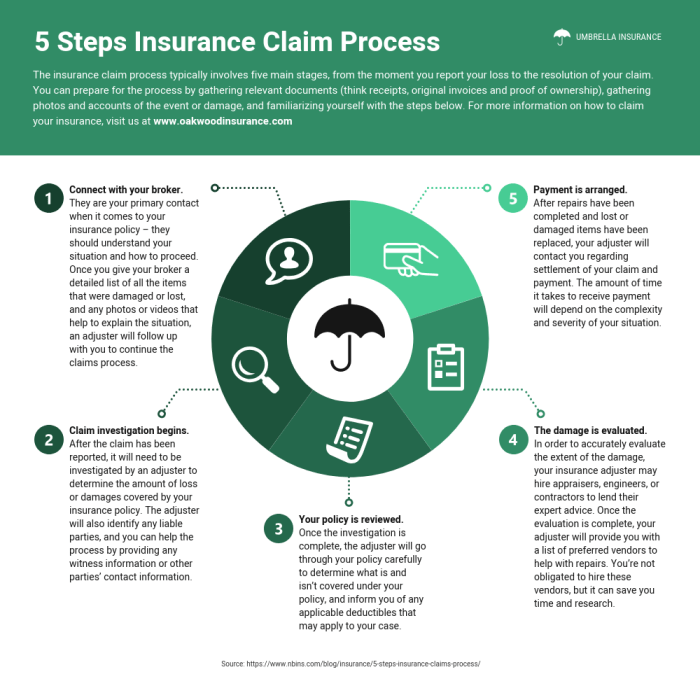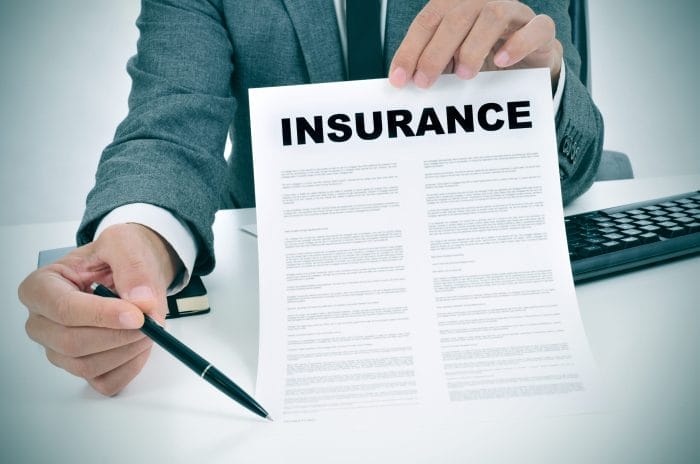Dealing with insurance claims can be a daunting task, especially when you’re at fault. However, with the right approach and understanding, you can navigate the process smoothly and effectively. This guide provides comprehensive tips and strategies to help you handle insurance claims that are your responsibility, ensuring a fair and efficient resolution.
From the importance of honesty and transparency to effectively communicating with insurance adjusters, we’ll cover all aspects of the claims process. We’ll also delve into understanding your insurance policy, documenting the incident, dealing with delays and disputes, and preventing future claims.
By following these guidelines, you’ll be well-equipped to manage your fault-based insurance claims with confidence and ease.
Dealing with Insurance Claims

Dealing with insurance claims, especially when they’re your fault, can be stressful and overwhelming. However, by being honest, transparent, and organized, you can navigate the process more effectively and increase your chances of a successful claim.
Honesty and Transparency
Honesty and transparency are crucial when reporting an insurance claim. Misrepresenting or omitting information can jeopardize your claim and even lead to legal consequences. Be truthful about the incident, including your role in causing it. This will help the insurance company assess the claim accurately and fairly.
Accurately Completing Claim Forms
Insurance claim forms often require detailed information about the incident, damages, and supporting documentation. Take your time filling out the forms, providing accurate and complete information to the best of your knowledge. If you’re unsure about a question, contact your insurance company for clarification.
Effective Communication with Insurance Adjusters
Insurance adjusters are responsible for evaluating and settling claims. When communicating with them, be polite, cooperative, and responsive. Provide clear and concise explanations of the incident and answer their questions honestly. If you have any concerns or disagreements, express them respectfully and professionally.
Understanding Insurance Policies

Before filing an insurance claim, thoroughly reading and comprehending the terms and conditions of your policy is essential. This knowledge helps you understand the coverage provided, exclusions, and limitations that may impact your claim’s outcome.
Exclusions and Limitations
Insurance policies often contain exclusions, which are specific situations or circumstances where coverage is not provided. These exclusions vary depending on the policy type and insurer. Common exclusions include:
- Intentional acts: Coverage is typically not provided for damages or losses resulting from deliberate or intentional acts of the insured party.
- Criminal acts: Insurance policies generally exclude coverage for damages or losses arising from criminal activities committed by the insured party.
- Wear and tear: Policies may exclude coverage for damages or losses resulting from gradual deterioration or wear and tear over time.
Additionally, limitations may apply to claims, such as caps on the amount of coverage provided or specific conditions that must be met for coverage to apply.
Deductibles and Copayments
Insurance policies often include deductibles and copays, which are amounts that the insured party is responsible for paying before the insurance coverage takes effect.
A deductible is a fixed amount that the insured party must pay out of pocket before the insurance company starts covering the remaining costs of a claim. Copayments, also known as coinsurance, are a percentage of the total cost of a covered expense that the insured party is responsible for paying.
Understanding these concepts and how they apply to your policy is crucial for managing your financial responsibilities during the claims process.
Documenting the Incident

In the unfortunate event that you find yourself at fault for an incident resulting in an insurance claim, it’s crucial to thoroughly document the situation to ensure a smooth and successful claims process. Here’s how to effectively document the incident:
Taking Photos and Videos
1. Capture the Scene
Take multiple photos from various angles, ensuring to include wide shots that provide a comprehensive view of the incident and close-ups of any damages or injuries.
2. Focus on Details
Pay attention to capturing specific details like license plate numbers, vehicle damage, property damage, or any visible injuries.
3. Document the Surroundings
Take photos of the surrounding area, including traffic signs, road conditions, and any relevant landmarks or buildings.
4. Record Videos
If possible, record videos that provide a visual representation of the incident and its aftermath.
Creating a Written Account
1. Write a Detailed Description
Provide a detailed account of the incident, including the date, time, and exact location. Describe what happened, how it happened, and the sequence of events leading up to the incident.
2. Include Witness Information
If there were any witnesses to the incident, obtain their contact information and statements. Their accounts can provide valuable corroboration of your version of events.
3. Report Injuries
If there were any injuries, provide detailed information about the nature and extent of the injuries, including any medical treatment received.
Obtaining Estimates or Quotes
1. Property Damage
If the incident resulted in damage to property, obtain estimates or quotes for repairs or replacement of the damaged items. This documentation will help the insurance company assess the extent of the damage and determine the appropriate compensation.
2. Vehicle Damage
If vehicles were involved, obtain estimates or quotes for repairs from a qualified mechanic. These estimates should include a detailed description of the damage and the cost of repairs.
Communicating with Insurance Adjusters

Insurance adjusters play a crucial role in evaluating claims and determining payouts. Effective communication with adjusters is essential for a smooth claims process and a fair settlement.
Preparing for Communication
Before contacting your insurance adjuster, gather all relevant documentation related to the claim, including police reports, medical records, and repair estimates. Being organized will help you provide clear and concise information during the conversation.
Initial Contact
When you first speak with the adjuster, provide a brief overview of the incident and the damages incurred. Be honest and straightforward, and avoid exaggerating or fabricating details.
Be Responsive
Insurance adjusters may request additional information or documentation to support your claim. Respond promptly to these requests, as delays can hinder the claims process. Keep track of all communication with the adjuster, including emails, phone calls, and letters.
Negotiating a Settlement
Once the adjuster has assessed the damages and liability, they will propose a settlement amount. If you believe the offer is unfair, you can negotiate for a higher settlement. Be prepared to provide evidence to support your claim, such as comparable repair estimates or medical bills.
Professionalism and Courtesy
Throughout the communication process, maintain a professional and courteous demeanor. Avoid becoming confrontational or argumentative, as this can damage the relationship with the adjuster and potentially jeopardize your claim.
Dealing with Delays and Disputes

Dealing with delays and disputes in the insurance claims process can be frustrating, but there are strategies to manage these situations effectively. Understanding the reasons for delays and following up regularly with insurance companies can help expedite the process. Filing complaints with state insurance departments or seeking mediation or arbitration can be necessary for resolving disputes.
Maintaining a positive attitude and being patient throughout the claims process is crucial for a successful outcome.
Understanding Delays in the Claims Process
Delays in the claims process can occur for various reasons, including:
- Incomplete or inaccurate information provided by the policyholder.
- The complexity of the claim.
- Backlogs at the insurance company.
- Disputes over liability or coverage.
To minimize delays, policyholders should ensure they provide all necessary information accurately and promptly. They should also follow up with the insurance company regularly to check on the status of their claim.
Resolving Disputes with Insurance Companies
Disputes with insurance companies can arise due to disagreements over liability, coverage, or the amount of the claim. In such cases, policyholders should:
- Review their insurance policy carefully to understand their coverage and rights.
- Gather evidence to support their claim, such as photos, receipts, and witness statements.
- Attempt to resolve the dispute directly with the insurance company through negotiation.
If the dispute cannot be resolved through negotiation, policyholders can file a complaint with their state insurance department. They can also seek mediation or arbitration to resolve the dispute.
Maintaining a Positive Attitude and Being Patient
Dealing with insurance claims can be a lengthy and challenging process. It is important to maintain a positive attitude and be patient throughout the process. This can help policyholders stay focused on their goal of obtaining a fair settlement for their claim.
Preventing Future Claims

Taking proactive measures to prevent future insurance claims can save you money and hassle in the long run. Here are some strategies to consider:
Defensive Driving
Adopt safe driving habits, such as obeying speed limits, avoiding distractions, and maintaining a safe following distance. Defensive driving can significantly reduce the risk of accidents.
Vehicle Maintenance
Regularly maintain your vehicle to keep it in good working condition. This includes oil changes, tire rotations, brake inspections, and other essential services. A well-maintained vehicle is less likely to break down or cause an accident.
Home Security
Secure your home against theft and damage. Install security systems, locks, and alarms. Keep your doors and windows locked when you’re away. Consider investing in a home security system to deter burglars and provide peace of mind.
Emergency Preparedness
Create a home emergency kit with essential supplies like food, water, first aid, and a flashlight. Develop a plan for responding to natural disasters like earthquakes, floods, or hurricanes. Knowing what to do in an emergency can help minimize damage and protect your property.
Review Insurance Policies
Regularly review your insurance policies to ensure they provide adequate coverage. Consider your lifestyle changes, property value fluctuations, and any new risks that may have emerged. Make updates to your policies as needed to ensure you’re fully protected.
Final Conclusion

Remember, insurance claims are not just about getting compensated for damages; they’re also about protecting your financial well-being and peace of mind. By applying the tips and strategies Artikeld in this guide, you can navigate the claims process with confidence, ensuring a fair settlement and minimizing the impact of your fault-based claims.
FAQ
What should I do immediately after an incident that may lead to an insurance claim?
Immediately document the incident by taking photos and videos, creating a detailed written account, and obtaining estimates for repairs or replacements. Notify your insurance company promptly and provide all necessary information accurately and completely.
How can I effectively communicate with insurance adjusters?
Be prepared, organized, and responsive to requests for additional information. Clearly explain the incident and provide supporting documentation. Maintain a professional and respectful demeanor, and be willing to negotiate a fair settlement amount.
What steps can I take to prevent future claims?
Drive defensively, maintain your vehicle properly, and secure your home against theft and damage. Create a home emergency kit and develop a plan for responding to natural disasters. Regularly review your insurance policies and make updates as needed.



